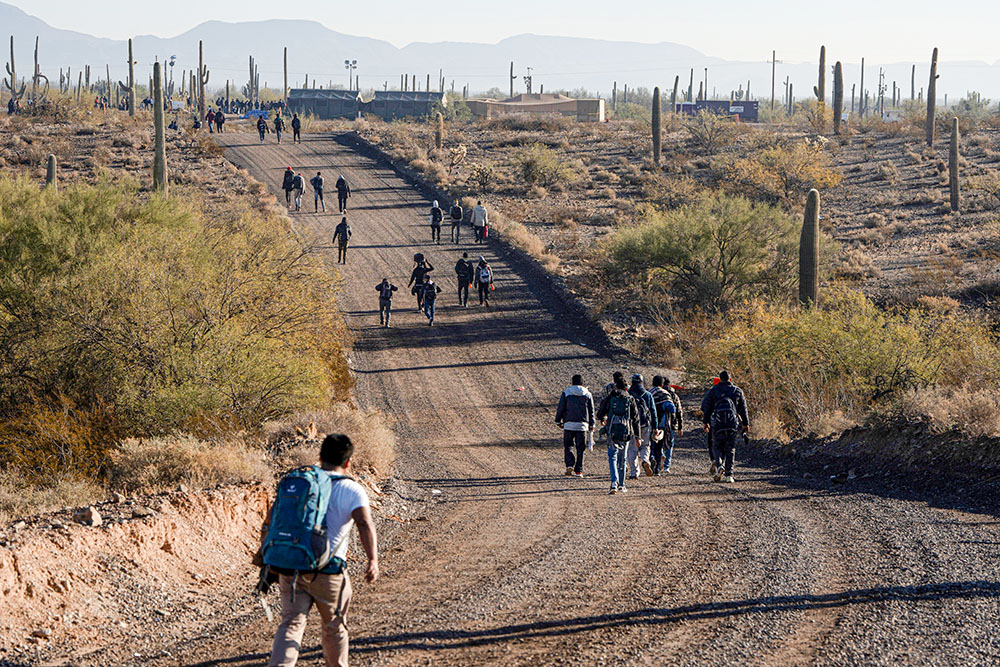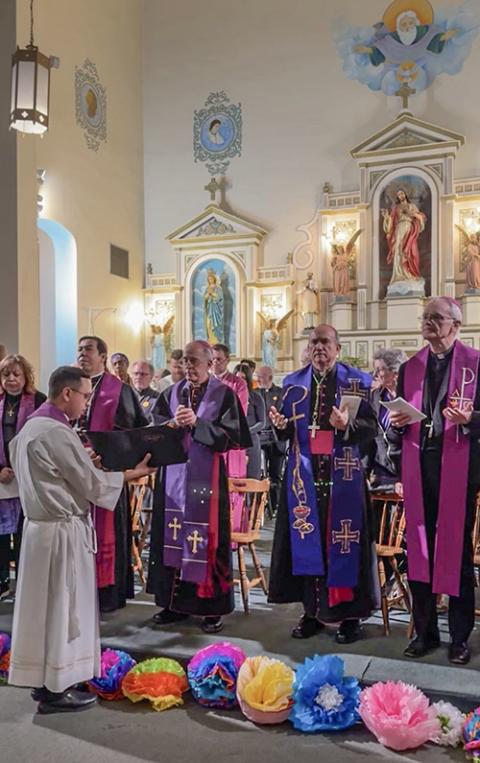
Migrants walk to a processing facility as directed by Border Patrol at the U.S.-Mexico border near Lukeville, Arizona, Dec. 25, 2023. (OSV News/Reuters/Rebecca Noble)
During this election year, the issue of immigration has risen to be one of the top concerns of many U.S. voters, who have witnessed an increase in arrivals at the U.S.-Mexico border. Immigration opponents, including many Republicans, have taken the opportunity to fan the flames of fear, using the term "invasion" to describe the situation at the border and proposing draconian legislation to address it.
President Joe Biden, the primary target of Republican attacks, has responded by proposing his own restrictive policies, including limiting asylum and closing the border to new arrivals.
To make matters worse, Catholic organizations who work with migrants are under attack, with some Republicans in Congress threatening to defund groups, including Catholic Charities agencies, that provide newcomers with basic necessities. And the Texas attorney general is attempting to shut down Annunciation House, a Catholic shelter in El Paso that has been providing support to migrants for nearly 50 years. What those targeting Catholic organizations fail to acknowledge is that their work is in concert with the federal government and federal law, not against it.
To put it mildly, the political landscape on the issue of immigration has changed, and from the perspective of church teaching, not for the better. Catholics in the pews, although generally supportive of immigrants, share legitimate concerns about the recent increase in arrivals and how the government is responding to it.
Given these circumstances, how should Catholic advocates, including the U.S. bishops, react to the shifting political landscape?
In order to reset the debate beyond who can suggest the most restrictive enforcement-only policies — policies that, by the way, have failed for 40 years — the church must play a central role as one of the largest pro-immigrant institutions in the country. Here is an attempt at a blueprint for Catholic leaders and advocates to follow:
Defend the church's mission without fear.
The church is no stranger to being attacked by civil authorities because its mission may conflict with societal expectations. The Catholic community must respond strongly to any attempts to limit its mission to help the disadvantaged and dispossessed.

At Sacred Heart Parish in El Paso, Texas, March 21, Bishop Mark Seitz (third from right) speaks during an interfaith vigil to pray for the dignity of migrants. (OSV News screenshot/Live broadcast via Facebook)
A recent interfaith march and prayer service in El Paso, Texas, led by Bishop Mark Seitz, chairman of the U.S. Conference of Catholic Bishops' Committee on Migration, is a fine example of peaceful resistance. Bishop Kevin Rhoades of South Bend, Indiana, chairman of the bishops' Religious Liberty Committee, recently released a statement correctly framing the church's mission toward migrants as a religious freedom issue.
Respond to dehumanizing language about immigrants.
Former President Donald Trump, the presumptive Republican presidential candidate this year, recently stated that immigrants were "poisoning the blood of our country" and that they were "animals." Such dehumanizing language requires a strong response from Catholic leaders, but none has been forthcoming.
Not to be partisan, there was no response to Biden's use of the word "illegal" during the State of the Union address, either.
This type of language becomes normalized when there is no response from faith leaders and others. It should be a teaching moment for Catholics, not a missed opportunity.
Explain the church's position on borders more effectively.
It should be no secret that Catholic teaching acknowledges the right of a nation to control its borders and to decide who should be allowed to enter the country. This part of the teaching, however, is not well understood by the average Catholic.
The church's position is that border management is a necessary component of any immigration system but should not undermine the human rights and dignity of the individual, as often is seen in the enforcement methods deployed by the government. By better articulating this teaching, and offering humane alternatives to more stringent forms of enforcement, the church may be able to persuade the vast number of Catholics in the pews who are ambivalent, if not hostile, on the issue.
Highlight the contributions of immigrants more frequently.
Most Americans do not believe that immigrants as a group positively impact their lives. They do not view the issue like they might a reduction in their tax burden or an expansion of health care coverage.
Advertisement
The truth is that immigrants contribute significantly to our economy and culture. If the undocumented population of the country were deported tomorrow — as Trump has proposed — gross domestic product would decrease by nearly $5 trillion over a decade. The labor shortage the nation faces in many industries would be exacerbated, while inflation would rise and production decrease.
Stick to the church's policy positions, but become more flexible as to how they are achieved.
It is clear that the prospect of comprehensive immigration reform — in which one bill fixes every aspect of the immigration system — is politically out of favor at the moment. This does not mean, however, that its components, including a broad-based legalization — are forever dead. As the saying goes, there is more than one way to skin a cat. Immigration advocates should take a more incremental approach to reforming the system, looking for opportunities in every legislative vehicle to advance a portion of reform. They also should continue to push the executive branch to pursue pro-immigrant regulatory policy.
To his credit, for example, Biden has liberally used humanitarian parole authority to create more legal avenues for migration, while his broad use of temporary protected status (TPS) has permitted immigrants from unstable countries to legally remain in the U.S. and work. In the legislative realm, the legalization of specific groups that have traditionally enjoyed bipartisan support, such as immigrant youth (Dreamers) and agricultural workers, should be pushed as part of any immigration border package.
U.S. history has shown that the nation goes through periods of nativism — from the era of the "Know Nothings," to the Chinese Exclusion laws, to today's version led by Trump. Through it all, however, the U.S. has, by and large, maintained its identity as a nation of immigrants.
It is no different today. While we may be experiencing a dark period in the nation's immigration history, the church's mission to help the vulnerable — to welcome the stranger, as Christ has instructed us — will not change and will help lead the nation out of the darkness. As Seitz reminded the crowd during the El Paso vigil, it is during the most difficult times that God's grace is present.








